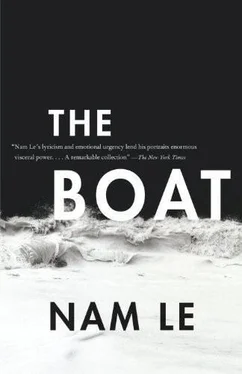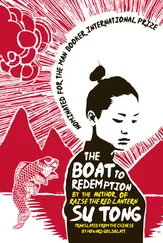Sarah let go of her breath. This was why she'd come-to see exactly this — the city as it was — the proof of this place unthinkably outside herself.
Now an enormous square canvas floated down the street, hoisted on two poles and luffing like a sail in the wind. It depicted a black-bearded man. His eyes soulful, mascara-dark, watching everything. The street was full of these pictures.
"Imam Hussein!" shouted Parvin. The loudness of her voice almost tipped it into cheeriness.
He was shown in deep green robes and a black turban, and — with his gentle, cowlike eyes — looked bizarrely like an oriental Jesus. What had Parvin said about bin Laden? That it had to have been a mistake: that no one so soft-spoken, with such kind eyes, with that flossy beard, could have been responsible. It was difficult, sometimes, to tell when she was joking.
"Grandson of the Prophet." That was Mahmoud speaking — he'd caught up with them from behind.
But Parvin was already pushing farther into the mayhem. They came across a low gnarl of bodies: a man with white pants lay on the ground bleeding from his scalp, his hands interlocked around his head as though to improvise a basin. People converged, crouched over him, then kept onward. Sarah realized with horror that they were dipping their sleeves into his blood.
"Why are they — "
The drums drowned her out. She rooted herself within the milling mass and said it again, louder: "Why are they doing that?"
It was a street show extravaganza and she was being scripted, deeper and deeper, into panic. A test, she reminded herself. She could write her own part. Both Parvin and Mahmoud were a short distance ahead, on the opposite sidewalk — Parvin beckoning to her. Parvin, who'd assured her a few months ago it was worth coming just to see Ashura. There was a huge black cauldron behind them. A tarpaulin making the sound of surf as it flapped in the wind — something white and woolly weighing down its center. Sarah came closer, then shrank back. The carcass of a headless sheep — blood still dribbling, gel-like, from its stump, darkening its matted collar. On the sidewalk, spectators threw up their hands and wailed.
Parvin shoved a plastic cup into her hands. "Tea," she said loudly.
Sarah twisted back toward the parade.
"He is okay," said Mahmoud. He pointed at his head.
"He's not okay, he's bleeding!"
A troop of women and girls poured down the street, coalescing around the prone figure. They were dressed in full black chadors — covering everything but their shoes and faces — and their faces shone out from within their black hoods like beacons of pale grief.
"You are thinking 'What a barbarism,' " shouted Mahmoud. "You are thinking, 'There is much violence in Islam.' "
Some of the women, Sarah noticed, wore white sneakers. They were keening to music that crackled from a ghetto blaster. White and yellow tulips sprang from their hands.
Mahmoud pointed at his head again, a certain shyness in the gesture. Sarah realized her head scarf had slipped down to her neck. She quickly pulled it up over her hair, turned back to face him.
"I was thinking 'Poor sheep,' 'Poor man.' "
"The man," he replied with a small smile, "he cuts his head to remember the imam's suffering."
"And the sheep?"
From nowhere, a bearded figure in a black gown and white cap brandished a metal rod in front of her face. She cringed, closed her eyes, then felt the spray of water on her cheek.
Both men enjoyed this. "Perfume," explained Mahmoud, "for pilgrims."
Parvin cupped Sarah's elbow in her palm.
The man walked away. There was a metallic tank affixed to his back like a rocket pack. Sarah's face smelled of musk and amber. Dime store deodorant. She made a decision. She swiped the wetness of her cheek onto her fingers and made to flick it at Mahmoud 's face, his smooth-skinned jaw.
"Please," he said, taking a step back.
She flushed. "We're all pilgrims," she said.
* * *
LONG BEFORE SHE'D SET FOOT on its streets, this world had already conspired to throw her off balance. When Parvin first told her she'd founded, with typical slapdash resolve, a weekly call-in radio program agitating for women's rights reform in Iran, Sarah hadn't known what to think. Back then — four years ago — no one did much thinking about Iran. At most, people in her circle were predisposed to a vague solidarity with the country — arising from the sense that any place reprehended by an administration itself so reprehensible couldn't be all that bad.
Parvin had her own ideas. She taught herself how to produce an audio program at a local college; how to stream it online to a company in Holland, which then broadcast it live, via shortwave radio, into Iran. Shortwave — what did that even mean? Her show, Tehran Calling , was live, direct, unrehearsed: its proclaimed mission the complete political, economic and religious liberation of the Iranian woman. Its callers broke the law — risked their lives — every time they called. Sarah indulged her friend's effusions. She'd become used to them. Ever since they'd met in college, Parvin had enthralled herself with one cause or another. What was surprising to Sarah was that Parvin had actually chosen this cause: she'd always been close-lipped — even cagey — about her past in Iran. She'd left as a teenager, Sarah knew that. Her parents had sent her to Europe. Beyond that was a studiedly offhand trail of red herrings: a Swiss boarding school, a German boyfriend, an older divorcé who'd been an offroad racer, a father who'd been a university professor. Sarah could never have predicted that the show would make Parvin a minor celebrity in the Persian reformist movement — let alone that it would pave the way, ultimately, for her re-emigration.
The truth about the show: Sarah had always had trouble taking it seriously. For one, everybody who called in spoke English. Of course it was a show in English, but how could she take seriously the oppression of this far-flung people who were not only English-speaking — but so liberally educated? Who could afford to make these regular international calls? Her misgivings were foolish-she knew that. But on the occasions when Sarah had dropped by the studio, she'd repeatedly heard words like oppression , lectures laced with jargon and political-science abstractions, and it didn't help that Parvin seemed to absorb, expansively, unconsciously, the heavy Persian accent of her callers. To Sarah it seemed that, as the show grew in popularity, it developed more and more a sense of staged parody.
Once, she'd stepped in near the end of a show and heard a thickly accented male voice ask: "What do you look like?"
Parvin had thrown Sarah a look — a look full of slyness, scorn, self-mockery — and instantly it had dawned on Sarah that Parvin had changed, that she'd drawn away, steadily and for some time, from that side of herself. The side that Sarah knew.
"I think you are ugly," the man said. "Your voice is ugly."
The rest of the hour slid into bewildering invective: Parvin was a monarchist, she was un-Islamic, she was funded by the CIA, she was completely ignorant. Not once did she hang up. She let her callers talk. It wasn't until much later that Sarah learned she'd stumbled on the anniversary of the 1999 student uprisings; then, in the small, too-bright studio that evening, Sarah had struggled to puzzle out her own feelings. She'd never seen her friend like that. Where was the headstrong, irreverent Parvin? the hot-tempered disputant? the career radical who nevertheless prided herself on maintaining professional irony at all times? Where was the strength and variousness on which Sarah had always drawn-and often over-relied? She should say something. What should she say? How to navigate that space between sympathy, tact, unconcern?
Читать дальше











